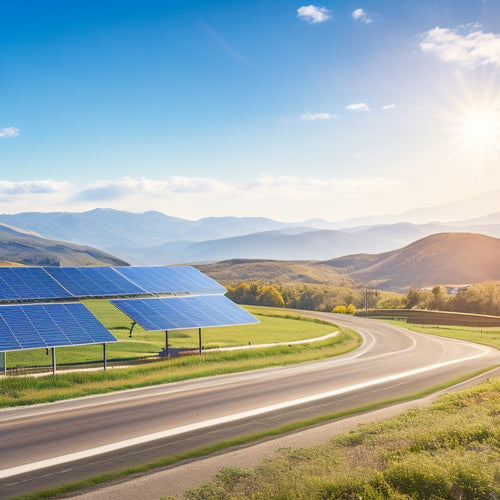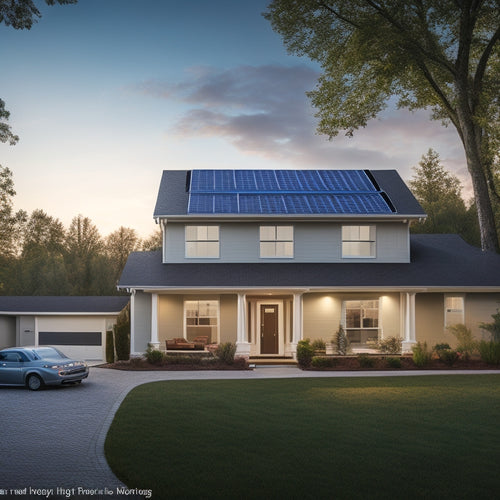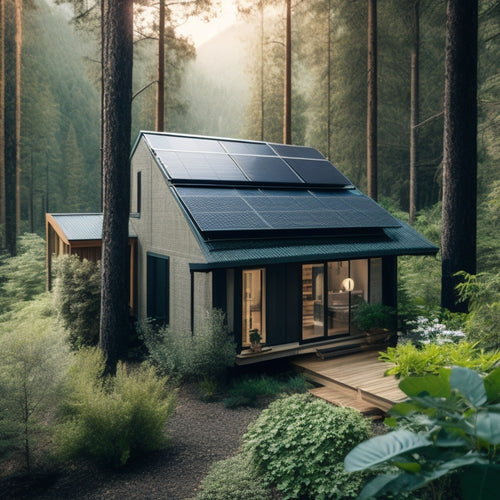
What Powers Your Off-Grid Cabin?
Share
You power your off-grid cabin with a customized system that meets your specific energy needs, combining solar panels, energy storage systems, and power inverters to provide reliable electricity. Solar panels, such as monocrystalline or polycrystalline, convert sunlight into DC power, which is then inverted into AC power for your cabin's use. Energy storage systems, including lithium, lead acid, or nickel-cadmium batteries, store excess energy for later use. By understanding your energy requirements, you can design a system that efficiently powers your cabin's essentials, and with smart management, you can maximize your energy harvesting potential and overcome common challenges - now, investigate the details to optimize your off-grid setup.
Key Takeaways
- Solar power systems, including solar panels, inverters, and mounting systems, convert sunlight into electricity for off-grid cabins.
- Energy storage systems, like lithium, lead acid, and nickel-cadmium batteries, store excess energy for later use, ensuring a reliable power supply.
- Wind turbines, micro-hydroelectric systems, and biomass energy sources can supplement solar power, providing a diverse range of renewable energy options.
- Efficient power use is achieved through energy-efficient appliances, load management systems, and scheduling energy-intensive tasks during peak harvesting times.
- Regular maintenance of solar battery systems, including monitoring state of charge and depth of discharge, is crucial for extending battery lifespan and ensuring optimal performance.
Choosing the Right Portable System
Three key considerations will dictate your choice of portable power system: your energy needs, the type of off-grid cabin you're powering, and the duration of your stay.
You'll need to calculate your total energy requirements, taking into consideration the number and type of appliances you'll be running. The type of cabin you're powering will also impact your choice, as some systems are better suited for small, efficient cabins, while others can handle larger, more energy-intensive spaces.
When evaluating your energy needs, consider factors like capacity, depth of discharge, and round-trip efficiency, which are vital in determining the overall performance of your portable power system residential battery systems. This is particularly important if you're planning to integrate renewable energy sources, such as solar or wind power, into your off-grid setup.
Finally, the length of your stay will influence your decision, as some systems are designed for short-term use, while others can provide power for extended periods.
Considering these factors will help you choose a portable power system that meets your needs and maximizes system efficiency.
Key Components of Solar Panels
Since you're considering integrating solar power into your off-grid cabin setup, it is essential to understand the key components of solar panels that convert sunlight into electrical energy. These components include photovoltaic (PV) cells, a mounting system, and an inverter. PV cells are the heart of the solar panel, converting sunlight into DC power. The mounting system secures the panels to your cabin's roof or a ground-mounted racking system. The inverter converts DC power to AC power, usable in your cabin.
| Solar Panel Type | Efficiency | Installation Consideration |
| Monocrystalline | 20-22% | More expensive, high-performance |
| Polycrystalline | 15-18% | Less expensive, moderate-performance |
| Thin-Film | 7-14% | Least expensive, low-performance |
| Bifacial | 20-22% | Higher cost, increased energy yield |
| Flexible | 7-14% | Lightweight, easy installation
Powering Your Cabin's Essentials
Your off-grid cabin's power system must be designed to meet the energy demands of its essential appliances and devices.
You'll need to take into account the power requirements of your sustainable appliances, off-grid lighting, and other must-haves. Effective energy management involves optimizing charging efficiency high-efficiency solar charging solutions and selecting reliable off-grid power systems that cater to diverse energy needs.
Wind turbines and backup generators can supplement your solar power, ensuring a reliable energy supply. To optimize energy conservation, implement smart home technologies that enable energy monitoring and control.
Portable power options, like battery banks, can provide additional flexibility. By balancing your energy needs with your power generation and storage capabilities, you'll create a sustainable and efficient off-grid cabin.
Solar Battery Maintenance Tips
Optimize your off-grid cabin's solar power system by keeping its batteries in top condition. A well-maintained battery bank can greatly extend its lifespan and guarantee a reliable energy supply.
Regular monitoring of battery state of charge (SOC) and depth of discharge (DOD) prevents overcharging and undercharging, and setting a discharge limit between 20% and 50% extends solar battery lifespan and maintains health.
To create a maintenance schedule, follow these essential tips:
- Check the battery state of charge (SOC) regularly to confirm it's within the recommended range.
- Monitor the battery temperature, as high temperatures can reduce its lifespan.
- Perform equalization charges every 1-3 months to balance the battery cells.
- Inspect the battery terminals and connections for signs of corrosion or wear.
- Keep the battery bank clean and free of debris to improve airflow and reduce the risk of overheating.
Maximizing Energy Harvesting Potential
You'll want to optimize your off-grid cabin's energy harvesting potential by leveraging a combination of renewable energy sources, such as solar, wind, and hydro power, to generate electricity.
Effective energy storage systems, including batteries and backup generators, will guarantee a steady supply of power when the sun isn't shining or the wind isn't blowing.
Renewable Energy Sources
Employing renewable energy sources is essential for off-grid cabin power, as it reduces reliance on fossil fuels and minimizes environmental impact.
You'll want to reflect on the following options to enhance your energy harvesting potential:
-
Wind Energy: Capture wind power using turbines that convert kinetic energy into electricity, ideal for areas with consistent wind patterns.
-
Hydro Power: Exploit the energy of moving water with micro-hydroelectric systems, suitable for cabins near streams or rivers.
-
Biomass Energy: Burn organic matter like wood chips or agricultural waste to produce heat or electricity, a viable option for areas with abundant biomass resources.
-
Geothermal Systems: Tap into the Earth's natural heat using ground-source heat pumps, suitable for areas with suitable geology.
-
Solar Thermal: Make use of solar radiation to heat water or air, ideal for cabins with ample sunlight and hot water demands.
These renewable energy sources can greatly reduce your reliance on fossil fuels and minimize your environmental footprint.
Energy Storage Systems
Two essential components of off-grid cabin power are energy harvesting and energy storage.
You've invested in renewable energy sources, but without a reliable energy storage system, you'll struggle to maximize your energy harvesting potential.
Lithium batteries have become a popular choice for off-grid cabins due to their high energy density, long lifespan, and low maintenance requirements.
However, lead acid batteries still offer advantages, including lower upfront costs and well-established recycling infrastructure.
When selecting an energy storage system, consider factors like depth of discharge, round-trip efficiency, and compatibility with your energy harvesting setup.
Efficient Power Use
By virtue of your investment in renewable energy sources and a reliable energy storage system, you're now positioned to maximize your energy harvesting potential through efficient power use.
Efficient power use is vital to guarantee you get the most out of your off-grid cabin's energy system. This involves adopting energy conservation habits and implementing effective power management strategies.
Some key considerations for efficient power use include:
- Using energy-efficient appliances and lighting to reduce energy consumption
- Implementing a load management system to prioritize energy use
- Scheduling energy-intensive tasks during peak energy harvesting periods
- Monitoring energy usage and adjusting habits accordingly
- Incorporating energy recovery systems, such as regenerative braking, to recapture energy
Overcoming Common Challenges
As you work to power your off-grid cabin, you'll encounter challenges that can impact your energy independence.
You'll need to traverse the intricacies of energy storage options, such as battery types and charging systems, to guarantee a reliable power supply.
Additionally, you'll have to evaluate and optimize your renewable energy sources, including solar, wind, and hydro power, to maximize their output and efficiency.
Energy Storage Options
Your off-grid cabin's energy storage system plays a critical role in ensuring a steady supply of power, even when the sun isn't shining or the wind isn't blowing.
This system helps to mitigate the effects of intermittent renewable energy sources, providing a reliable supply of power when you need it.
When it comes to energy storage options, you have several choices, including:
- Lead-acid batteries: a cost-effective option, but less energy-efficient
- Lithium-ion batteries: offer higher energy density and longer lifetimes, but are more expensive
- Nickel-cadmium batteries: provide good cycle life and moderate energy density
- Flow batteries: ideal for long-duration energy storage and grid-scale applications
- Sodium-ion batteries: a newer, cost-effective alternative to lithium-ion batteries, with similar performance
Renewable Energy Sources
You've chosen to power your off-grid cabin with renewable energy sources, but you're likely aware that they come with their own set of obstacles.
Wind energy, for instance, requires consistent wind speeds and suitable turbine placement. Hydro power, another viable option, relies on a nearby water source and sufficient flow rates.
Geothermal heating, which utilizes the earth's natural heat, demands suitable soil conditions and proper system installation. Biofuel options, such as biodiesel or ethanol, require careful fuel management and storage.
Despite these challenges, renewable energy sources offer a path to energy independence and off-grid solutions, aligning with sustainable living and eco-friendly technologies.
Frequently Asked Questions
Can I Use My Off-Grid Cabin During a Power Outage?
You can definitely use your off-grid cabin during a power outage, like the Jones' who survived a 5-day blackout with their solar-powered system, by employing power outage strategies like load management and energy storage, essential for off-grid living.
How Often Should I Clean My Solar Panels?
You should clean your solar panels every 6-12 months, depending on environmental factors, to maintain ideal efficiency; regular solar panel maintenance guarantees maximum energy output, and a cleaning frequency of every 6 months is recommended in areas with high particulate matter.
Are Lithium-Ion Batteries Safe for Off-Grid Cabins?
You're likely worried about lithium-ion batteries catching fire, but they're actually safer than other options; their advantages include a longer lifespan, higher energy density, and lower self-discharge rates, making them a reliable choice for your off-grid power needs.
Can I Add More Solar Panels to My Existing System?
You can expand your solar panel array to increase energy efficiency, but first, you'll need to assess your existing system's capacity and guarantee the new panels match the voltage and connector type to facilitate a seamless solar panel expansion.
Do I Need a Backup Generator for Cloudy Days?
You'll likely need a backup generator for cloudy days, as solar battery capacity may deplete quickly; consider sizing your battery bank to meet your energy needs during extended cloudy weather solutions, or investing in a gas or diesel generator for reliable power.
Related Posts
-

Is Switching to Green Energy Solutions Easy
Switching to green energy solutions isn't just easy; it's also beneficial. You can greatly cut utility costs and enjo...
-

Cost of Solar With Battery Backup
You're investing in a solar panel system with battery backup to guarantee reliable power during outages. The cost of ...
-

Off Grid Solar Batteries
As you shift to off-grid living, you'll rely on high-performance solar batteries to store excess energy generated by ...


